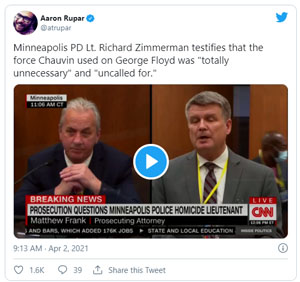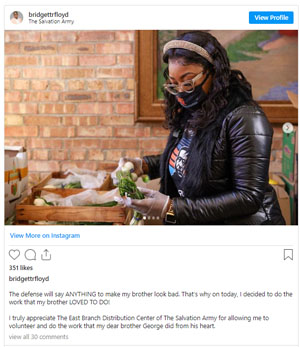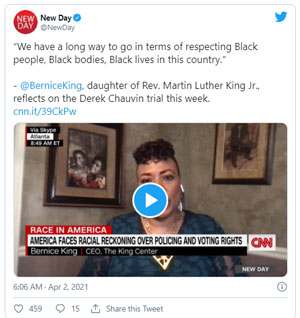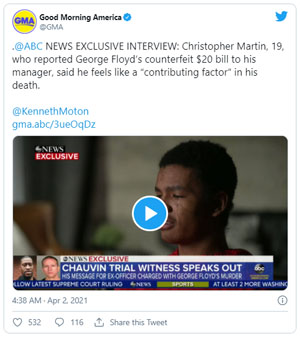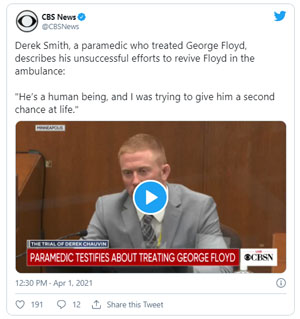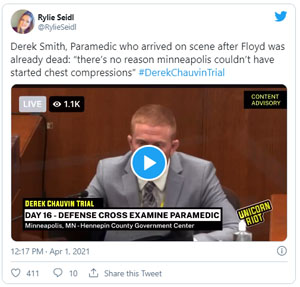Chauvin's use of force described as 'totally unnecessary' by Minneapolis lieutenant
by Timothy Bella and Abigail Hauslohner
The Washington Post
April 2, 2021 at 10:11 a.m. PDT
NOTICE: THIS WORK MAY BE PROTECTED BY COPYRIGHT
YOU ARE REQUIRED TO READ THE COPYRIGHT NOTICE AT THIS LINK BEFORE YOU READ THE FOLLOWING WORK, THAT IS AVAILABLE SOLELY FOR PRIVATE STUDY, SCHOLARSHIP OR RESEARCH PURSUANT TO 17 U.S.C. SECTION 107 AND 108. IN THE EVENT THAT THE LIBRARY DETERMINES THAT UNLAWFUL COPYING OF THIS WORK HAS OCCURRED, THE LIBRARY HAS THE RIGHT TO BLOCK THE I.P. ADDRESS AT WHICH THE UNLAWFUL COPYING APPEARED TO HAVE OCCURRED. THANK YOU FOR RESPECTING THE RIGHTS OF COPYRIGHT OWNERS.
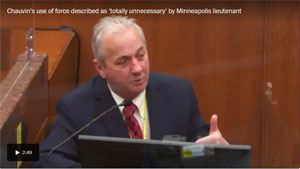
Lt. Richard Zimmerman testified in the Derek Chauvin trial on April 2 that, "once a person is cuffed, the threat level goes down all the way." (The Washington Post)
The trial is now in recess until Monday morning.
An emotional week of testimony in the trial of Derek Chauvin concluded Friday with Lt. Richard Zimmerman, the most senior officer in the Minneapolis Police Department, rejecting the former officer’s use of force against George Floyd, calling it “uncalled for” and “totally unnecessary.” Zimmerman testified that once someone is handcuffed, “they are not a threat to you at that point” and the amount of force should be immediately reduced. “If your knee is on a person’s neck, that could kill him,” he testified.
Eric Nelson, Chauvin’s attorney, argued Friday that police can use “improvisation” for “whatever force is reasonable and necessary.”
Here’s what to know:
• Minneapolis Police Sgt. Jon Edwards testified Friday that he responded to Cup Foods, described as a “critical incident” scene, not knowing that Chauvin was involved in the fatal encounter.
• In an interview Friday with “Good Morning America,” Chris Martin, a 19-year-old Cup Foods clerk, said through tears that he felt like a “contributing factor” in Floyd’s death outside the store.
• Zimmerman’s testimony came after former police supervisor David Pleoger said that Chauvin should have stopped kneeling on Floyd’s neck when he stopped resisting.
• When Chauvin first called Pleoger after the deadly arrest of Floyd, the former supervisor testified that Chauvin did not mention that he held his knee on the 46-year-old’s neck.
9:56 a.m.
Zimmerman: Chauvin should not have kept knee on Floyd’s neck until paramedics arrived
by Timothy Bella
Toward the end of his testimony Friday, Zimmerman said Chauvin should not have held his position on Floyd’s neck until paramedics arrived.
During cross-examination, Eric Nelson, Chauvin’s attorney, mentioned that his client kneeling on Floyd’s neck was a practice he called “holding for EMS” because “they are more capable to deal with whatever the situation is.”
Nelson argued that sometimes people are held in a restrained position until paramedics arrive on the scene to administer medical treatment.
When prosecutors had their turn to question Zimmerman, the lieutenant confirmed that just because police are “holding for EMS,” it does not excuse an officer from providing medical attention to someone in custody.
9:44 a.m.
Defense: Police can use ‘improvisation’ in use of force when lives are at stake
by Abigail Hauslohner
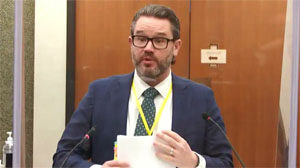
Eric Nelson, defense attorney for former police officer Derek Chauvin. (AP)
Chauvin’s lead defense attorney Eric Nelson on Thursday pushed back against Zimmerman’s statement that police have never been trained to use a knee on a suspect’s neck to restrain them.
Even if he was “never” trained “to use a knee on the neck of a suspect,” Nelson asked if Zimmerman would agree that “in a fight for your life,” an officer is “allowed to use whatever force is reasonable and necessary. … And that can even involve improvisation.”
“Agreed,” Zimmerman responded.
“Minneapolis Police Department policy allows a police officer to use whatever means are available to him to protect himself and others,” Nelson continued. “So if there’s a paint can sitting on the table and someone is attacked, you can use that paint can as a weapon.”
Zimmerman agreed to that, but rejected some of Nelson’s other characterizations of the situation.
Nelson later asked him if he saw any need for Zimmerman to improvise.
“I did not,” Zimmerman said.
9:17 a.m.
Zimmerman rejects Chauvin’s use of force against Floyd: ‘Totally unnecessary’
by Timothy Bella
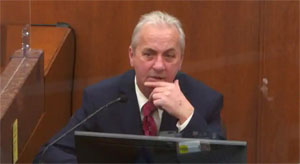
In this image from video, witness Lt. Richard Zimmerman of the Minneapolis Police Department testifies on Friday.
Zimmerman, a Minneapolis police lieutenant, on Friday rejected Chauvin’s use of force against Floyd, saying the former officer’s actions against the 46-year-old Black man were not needed once he was handcuffed.
“Totally unnecessary,” Zimmerman told prosecutors. “Pulling him down to the ground facedown and putting a knee on the neck for that amount of time is just uncalled for. I saw no reason why the officers felt they were in danger, if that’s what they felt. And that’s what they would have to feel to be able to use that kind of force.”
When asked by prosecutors whether Chauvin should have stopped his use of force once Floyd was restrained to the ground, Zimmerman replied, “Absolutely.”
Zimmerman, the most senior police officer with the Minneapolis Police Department, emphasized throughout his testimony that the threat level drops significantly once someone is handcuffed.
Aaron Rupar
@atrupar
Minneapolis PD Lt. Richard Zimmerman testifies that the force Chauvin used on George Floyd was "totallky unnecessary" and "uncalled for."
9:13 AM Apr 2, 2021
9:05 a.m.
Minneapolis Police Lt. Zimmerman: A knee on the neck is ‘deadly force’
by Abigail Hauslohner
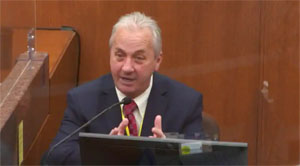
In this image from video, witness Lt. Richard Zimmerman of the Minneapolis Police Department David Pleoger, testifies as Hennepin County Judge Peter Cahill presides Friday, April 2, 2021, in the trial of former Minneapolis police Officer Derek Chauvin at the Hennepin County Courthouse in Minneapolis, Minn. Chauvin is charged in the May 25, 2020 death of George Floyd. (Court TV via AP, Pool)
Zimmerman, the most senior officer in the Minneapolis police department, on Thursday testified that the kind of actions taken by Chauvin go far beyond accepted police protocols.
A knee on the neck would be considered “the top tier” of force — “deadly force,” he said from the witness stand. “Because of the fact that if your knee is on a person’s neck, that can kill him.”
The threat that a suspect poses to an officer’s safety also drops significantly once they are handcuffed, Zimmerman said. The suspect’s safety at that point also becomes the officer’s responsibility, he said. “His well-being is your responsibility.”
“If they become less combative, you may just have him sit down on the curb. The idea is to calm the person down, and if they are not a threat to you at that point, you try to help them so that they’re not as upset as they may have been in the beginning,” he added.
One thing that officers learn about the effect of handcuffs, Zimmerman said, is that once an individual has had their hands cuffed behind their back, “it stretches the muscles back through your chest, and it makes it more difficult to breathe.”
“Once a person is cuffed, you need to turn them on their side or have them sit up. You need to get them off their chest,” he said. “Because of, as I mentioned earlier, your muscles are pulling back when you’re handcuffed, and when you’re laying on your chest, that’s restricting your breathing even more.”
Video evidence played during the trial has shown Chauvin and the three other officers holding Floyd facedown on the pavement as he cries out, his hands cuffed behind his back. Chauvin kneels on his neck, and another officer presses a knee into his back.
8:40 a.m.
Morries Hall, man who was with Floyd and refuses to testify, reportedly in police custody
by Timothy Bella
A man who was with Floyd in the moments before his death and has invoked the Fifth Amendment to avoid testifying in Chauvin’s trial is in police custody, according to a probable cause statement.
Morries Hall, 42, was reportedly arrested March 20 for an outstanding warrant after he violated a protective order in a domestic violence case, according to court records.
As first reported by the Law and Crime Network, Hall also had a second outstanding warrant for a separate case in Redwood County, Minn.
Hall was in Floyd’s car when police approached the 46-year-old about using an allegedly fake $20 bill to buy a pack of cigarettes.
Hall, who was looked at as a potential witness for Chauvin’s defense team, plans to invoke the Fifth Amendment if he is asked to testify in court, according to a court notice filed Wednesday.
8:30 a.m.
Minneapolis Police Dept. senior officer: ‘We don’t want people to get hurt’
by Abigail Hauslohner
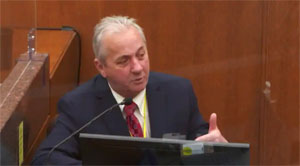
In this image from video, witness Lt. Richard Zimmerman of the Minneapolis Police Department David Pleoger, testifies as Hennepin County Judge Peter†Cahill presides Friday, April 2, 2021, in the trial of former Minneapolis police Officer Derek Chauvin at the Hennepin County Courthouse in Minneapolis, Minn. Chauvin is charged in the May 25, 2020 death of George Floyd. (Court TV via AP, Pool)
Lt. Richard Zimmerman, the most senior officer in the Minneapolis Police Department, took the stand Friday, testifying that he routinely instructs and reminds subordinate officers that “we don’t want people to get hurt — either the officers or the subjects” when executing search warrants.
Zimmerman, who supervises the department’s homicide unit, presides over responses to “critical incidents” — police-involved encounters in which an officer or member of the public either dies or is severely injured. He said he responded to the intersection in Minneapolis that night around 9 p.m., after receiving a call from his superior.
8:07 a.m.
Officer testifies he responded to Cup Foods not knowing Chauvin was involved
by Timothy Bella
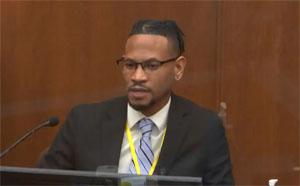
In this image from video, witness Minneapolis Police sergeant Jon Edwards testifies as Hennepin County Judge Peter Cahill presides Friday, April 2, 2021, in the trial of former Minneapolis police Officer Derek Chauvin at the Hennepin County Courthouse in Minneapolis, Minn. Chauvin is charged in the May 25, 2020 death of George Floyd. (Court TV via AP, Pool)
Minneapolis Police Sgt. Jon Edwards testified Friday that he was asked by authorities to respond to Cup Foods not yet knowing that Chauvin was involved in what he described as a "critical incident.”
Edwards told prosecutors he was instructed by Pleoger, then his police supervisor, to secure the area on May 25 because it "had the potential to be a possible critical incident.” The sergeant explained that a “critical incident” is usually an officer-involved incident where the officer or another person has died, or “has suffered great bodily harm that later led to death.”
When asked by prosecutors if he knew whether Chauvin was involved in the case at the time, Edwards said he did not know.
Edwards, who has been with Minneapolis police for 14 years, testified that he did not know Chauvin personally, but that he recognized him from working in the same precinct.
7:21 a.m.
Floyd’s sister volunteers at Salvation Army to keep mind off trial
by Timothy Bella
In a week in which witness after witness has taken the stand to recount the last moments of Floyd’s life, Bridgett Floyd volunteered at the Salvation Army on Thursday, helping others to get her mind off a trial that has gripped the nation.
Several miles away from the courtroom, Floyd’s sister told the Star Tribune that giving away food and smiling and joking with volunteers at the East Branch Distribution Center of the Salvation Army has been a needed distraction for her as witness testimony has intensified.
“This has already taken my mind off of what is going on [in the courtroom,] and I needed that a little bit,” she told the outlet. “It’s been a trying, trying week. And we will get through it. We will get through it.”
George Floyd was previously a security guard at a homeless shelter run by the Salvation Army.
Bridgettrfloyd
The Salvation Army
The defense will say ANYTHING to make my brother look bad. That's why on today, I decided to do the work that my brother LOVED TO DO!
I truly appreciate The East Branch Distribution Center of The Salvation Army for allowing me to volunteer and do the work that my dear brother George did from his heart.
Bridgett Floyd shared some of the photos on Instagram and offered a response to Chauvin’s defense team, which has repeatedly brought up the 46-year-old’s opioid addiction and substance abuse leading up to the fatal encounter at Cup Foods.
“The defense will say ANYTHING to make my brother look bad,” she wrote Thursday. “That’s why on today, I decided to do the work that my brother LOVED TO DO!”
7:00 a.m.
Opinion: Kneeling on George Floyd’s neck sent a message to everyone who saw it
by Eugene Robinson
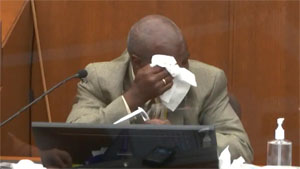
In this image from video, witness Charles McMillian becomes emotional as he answers questions as Hennepin County Judge Peter Cahill presides Wednesday, March 31, 2021, in the trial of former Minneapolis police Officer Derek Chauvin at the Hennepin County Courthouse in Minneapolis, Minn. Chauvin is charged in the May 25, 2020 death of George Floyd. (Court TV via AP, Pool)
Evidence presented this week in Derek Chauvin’s trial on charges that he murdered George Floyd showed a national audience how the former Minneapolis police officer saw his alleged victim: as a dangerous, “sizable” Black man who had to be controlled, subdued and forced to submit. The message Chauvin sent with his actions wasn’t intended for Floyd alone, and it’s one Black Americans have heard for centuries.
Chauvin didn’t see Floyd as a citizen suspected of a minor, nonviolent crime or as the gentle “mama’s boy” Floyd’s girlfriend, Courteney Ross, described. To Chauvin and the other officers, Floyd was guilty from the start — guilty of inhabiting an imposing Black male body, a circumstance that has always been a punishable offense in this country.
As witness Charles McMillian tried to tell Floyd when the officers first put their hands on him: “You can’t win.”
For me, McMillian’s Wednesday testimony was the most heartbreaking so far — and, sadly, the least surprising. At 61, he has lived long enough to know all about the criminalization of Black manhood. He cried on the witness stand as he described feeling “helpless” while Floyd — pinned to the ground, with Chauvin’s knee on his neck — cried out for his late mother. “I don’t have a mama either,” McMillian said. “I understand him.”
After the May 25, 2020, encounter was over, and Floyd’s limp and apparently lifeless body had been taken away by paramedics, McMillian is heard on bystander video bravely confronting Chauvin about his actions. Chauvin’s response says everything about the lens through which he saw Floyd: “We’ve got to control this guy because he’s a sizable guy. Looks like he’s probably on something.”
Think about the fact that Chauvin and the other officers thought they had to “control” Floyd in the first place. And think about how they initiated their encounter with him.
Police body-camera footage played Wednesday at the trial shows that one of the other then-officers, Thomas Lane, was the first to interact with Floyd. Lane rapped with his flashlight on the driver’s-side window of Floyd’s car, apparently startling Floyd, who opened the door slightly and said, “Oh, I’m sorry, I’m sorry.” Lane’s immediate reaction was to draw his service weapon, point it at Floyd and shout: “Get your fucking hands up right now!”
At that moment, both of Floyd’s hands were near the steering wheel, clearly visible to the officers. It is obvious on the video that he was neither holding nor reaching for any kind of weapon. Yet he suddenly found himself looking down the barrel of a policeman’s gun.
Like McMillian said: You can’t win.
Attempts by Chauvin’s defense attorney, Eric Nelson, to paint the onlookers who watched Floyd’s killing in horror as some kind of angry mob are laughable. Surveillance video played in court shows that the number of witnesses could be more accurately described as “a handful” than as “a crowd.” They were White and Black, male and female, very young and old. They invariably complied when the officers told them to back up and remain on the sidewalk. They have testified that their voices became progressively louder and more urgent, and the insults they directed at Chauvin more pointed, only because they saw Floyd’s condition deteriorating and feared they were watching a man being killed before their eyes.
The witnesses have almost all, like McMillian, spoken of how helpless they felt. Floyd “was in pain. It seemed like he knew it was over for him,” testified 18-year-old Darnella Frazier, whose shocking cellphone video was the first to show Floyd’s death to the world. “He was terrified. He was suffering.” Yet she and the rest of the onlookers were powerless to persuade the officers to let up and allow Floyd to breathe. They couldn’t even persuade Chauvin to let off-duty firefighter Genevieve Hansen, trained as an emergency medical technician, check Floyd’s pulse.
As for Chauvin, Frazier testified, “He just stared at us, looked at us. He had like this cold look, heartless.”
When I see that look Chauvin gave the onlookers, I see more than heartlessness. I see arrogance and superiority. I see him teaching an old lesson about who has power and who does not, about whom the law protects and whom it doesn’t. I see Chauvin demonstrating that he, not Floyd, got to decide whether Floyd was allowed to breathe.
Frazier, who is Black, told the court that when she remembers what she saw happen to Floyd, she can’t help but think about how her own father, brothers or uncles might find themselves in a similar situation and suffer the same fate. I have the same fears about my sons and myself.
Which means we all got Chauvin’s message. Loud and clear.
6:51 a.m.
Bernice King on Chauvin trial: ‘We have a long way to go in terms of respecting Black people’
by Timothy Bella
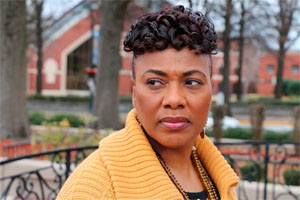
Bernice King is seen at the King Center in Atlanta on Jan 10, 2018. (Robert Ray/AP)
When asked what Chauvin’s trial has meant to her this week, Bernice King offered a simple answer Friday morning: The nation has “a long way to go” in respecting Black people.
“We have a long way to go in terms of respecting Black people, Black bodies, Black lives in this country,” King, the daughter of Martin Luther King Jr., said on CNN.
The chief executive of the King Center tweeted Thursday that Floyd’s death, stemming from an allegedly fake $20 bill, was “an evil inhumanity that’s traumatic to witness” over and over again during the trial.
On Friday, King said she hoped that Chauvin’s potential conviction would be a message that Black people should be treated with the dignity that Floyd did not receive at Cup Foods.
“It’s my hope and prayer in this trial that there will be a conviction to send a loud message that we, as Black people, are not just worthy, we should be treated with the respect and dignity at the hands of everyone including law enforcement,” she said.
New Day
@NewDay
We have a long way to go in terms of respecting Black people. Black bodies, Black lives in this country."
- @BerniceKing, daughter of Rev. Martin Luther King Jr., reflects on the Derek Chauvin trial this week.
cnn.it/39CkPw
6:06 AM Apr 2, 2021
6:30 a.m.
Opinion: Don’t read too much into the outcome of Chauvin’s trial
by Radley Balko
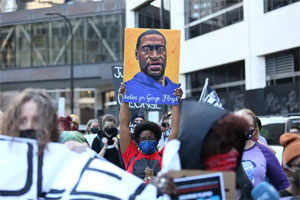
A demonstrator holds an image of George Floyd during a protest outside the Hennepin County Government Center in Minneapolis, Minnesota, U.S., on Monday, March 29, 2021. Prosecutors on Monday said a former police officer used excessive force against a defenseless and unarmed George Floyd, kicking off a murder trial taking place under extraordinary security in a city fearful of the unrest unleashed by the encounter last summer. Photographer: Emilie Richardson/Bloomberg
High-profile trials tend to teach us all the wrong lessons about the criminal justice system, and the trial of former Minneapolis police officer Derek Chauvin is no exception. The trial is so atypical of the day-to-day goings-on in our courts, it might as well be happening in another country.
Start with the fact that there’s a trial in the first place. Depending on the jurisdiction, up to 95 percent of criminal cases are resolved with a plea bargain before they ever reach a jury.
Then there’s the fact that Chauvin has a highly regarded private defense attorney leading a well-funded, union-backed team of lawyers and investigators. Nationally, about 80 percent of criminal defendants can’t afford to hire a defense attorney and turn to public defenders. Most public defenders are dedicated public servants, and in some places can provide better representation than private counsel. But in much of the country, they’re overworked, underpaid and have inadequate resources to hire private investigators and expert witnesses.
This case is also rare in that most police officers not only aren’t prosecuted for excessive force, they’re rarely disciplined in the first place. Between 2012 and May 2020 there were 2,600 misconduct complaints against Minneapolis police officers. Just 12 resulted in discipline, according to a May 30, 2020, New York Times article, with the most severe punishment being a 40-day suspension. Chauvin himself was the subject of 17 complaints and a brutality lawsuit, including other incidents in which he’d put his knee on other people’s necks for long periods of time. He received just two letters of reprimand. Investigations in large cities across the country consistently show that just a tiny percentage of complaints result in discipline, even though a small percentage of officers seem to generate a disproportionate number of complaints.
As for criminal charges, based on The Post’s fatal police shooting database, it’s likely that there have been as many as 1,000 fatal police shootings per year in much of the 21st century. Yet from 2005 to mid-2019, only 104 non-federal police officers were charged for killing someone while on duty. Thirty-five were convicted of some crime — just over 30 percent. In the general population, by contrast, about 70 percent of murder charges result in a conviction. Overall, police officers charged with felonies are convicted at about half the rate of everyone else. Once convicted, cops are about half as likely to receive a sentence that includes incarceration.
And while the public and media might attach any number of issues to a single trial, the verdict can turn on factors that have little to do with those factors. In my years of covering criminal justice reform, I’ve talked time and again to jurors who voted based on dislike of the prosecutor or defense lawyer. Verdicts can also be affected by jury instructions, juror personalities or mistakes made by either side that have little to do with the law or evidence.
The hunger for criminal accountability for George Floyd’s death is of course understandable. Given the advantages defendants such as Chauvin get that aren’t available to others, an acquittal would add only to the largely accurate perception that the powerful and protected get access to a different sort of justice than everyone else. Race looms large in all of this as well. An acquittal will only further ingrain in Black Americans the notion — backed by plenty of evidence — that the system doesn’t value their lives and rights as much as those of White Americans. The verdict also will of course matter immensely to Floyd’s family, friends and supporters. And I don’t mean to diminish how important it is that those victimized by police abuse feel that the justice system represents them, too.
But a single conviction won’t stop bad cops from continuing to abuse their power with impunity. It won’t stop police from disproportionately stopping, searching and subjecting Black people to force. It won’t reduce fatal police shootings. And it won’t give poor people better access to justice. A guilty verdict might deter police from using the tactic Chauvin used on Floyd, at least for a while, but it’s unlikely to deter other instances of excessive force or abusive behavior.
Years from now, Chauvin’s trial itself will seem relatively inconsequential. We’ll see Floyd’s death, on the other hand, as an incident of profound consequence. Along with other high-profile cases such as those of Breonna Taylor, Jacob Blake and Rayshard Brooks, Floyd’s passing sparked the largest, widest-reaching wave of civil rights protests in U.S. history, generating a tectonic shift in the public debate over race, policing and criminal justice.
Before last year, reforms such as ending no-knock raids or abolishing qualified immunity were discussed only at the fringes of public debate. Today, lawmakers across the country are enacting both. In 2020, police reform, drug decriminalization and criminal justice reform won nearly everywhere they were on the ballot. Just last week, Virginia, the capital of the former Confederacy, abolished the death penalty.
Chauvin’s trial matters in the way any trial matters — it demands a verdict driven by evidence, fairness and equal application of the law. But the legacy of Floyd’s death is already written. It effected, and continues to effect, substantive and tangible changes that make this a fairer, more just country. An acquittal can’t unravel that, and it doesn’t need to be validated with a conviction.
6:04 a.m.
Cup Foods clerk says he feels like a ‘contributing factor’ in Floyd’s death
by Timothy Bella
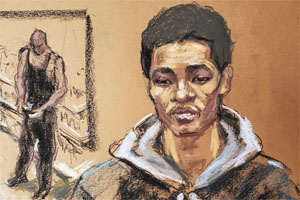
Cup Foods store employee Christopher Martin testifies on the third day of the trial of former Minneapolis police officer Derek Chauvin on March 31, in this courtroom sketch from a video feed of the proceedings. (Jane Rosenberg/Reuters)
Days after he expressed guilt in his testimony for not doing more to help save Floyd’s life, a Cup Foods clerk said Friday that he felt like a “contributing factor” in the 46-year-old’s death outside the store last May.
In an interview with “Good Morning America,” Chris Martin, 19, echoed his testimony in Chauvin’s trial, saying through tears that there was “so much pain and hurt that followed that was unneeded.”
“After this whole trial, whether or not he’s locked up, George Floyd is not here,” Martin said to ABC.
Martin reflected on how he approached Floyd after the 46-year-old paid for cigarettes with a $20 bill that the clerk figured was counterfeit.
“Not only am I like the contributing factor, I’m kind of like the big domino that fell,” he said, “and then now all of the small dominoes are just scattered.”
In his testimony Wednesday, Martin told prosecutors the actions of police that led to Floyd’s death could have been avoided if he had just refused to take the bill. Since he took the stand, the 19-year-old said that while he has received “extremely encouraging” feedback on his testimony, he still thinks about Floyd’s children and what all this has meant to them.
“I know what it’s like to grow up in an African American household without a father,” Martin said Friday. “I just hope and pray that George’s daughters know that they can do it and it’s possible to do it, to make it and to be successful — even if your father is no longer with you.”
Good Morning America
@GMA
@ABC NEWS EXCLUSIVE INTERVIEW: Christopher Martin, 19, who reported George Floyd's counterfeit $20 bill to his manager, said he feels like a "contributing factor" in his death.
@KennethMoton
gma.abc/3ueOqDz
4:38 AM Apr 2, 2021
6:00 a.m.
Derek Chauvin should not have knelt on George Floyd’s neck after he stopped resisting, former sergeant testifies
by Holly Bailey and Hannah Knowles
MINNEAPOLIS — Derek Chauvin should not have knelt on George Floyd’s neck after he stopped resisting, a former supervisor testified Thursday.
Chauvin also did not immediately tell the supervisor that he had knelt on Floyd’s neck while restraining him during a police investigation — waiting more than 30 minutes until he stood outside the hospital emergency room where Floyd remained unresponsive to disclose the information.
David Pleoger, who was a supervisor in the city’s 3rd Precinct on May 25, 2020, testified that he called Chauvin after getting a call from a concerned 911 dispatcher who was watching a city security camera and saw police holding Floyd on the ground.
“She called to say she didn’t mean to be a snitch, but she’d seen something while viewing a camera that she thought was concerning,” said Pleoger, a retired sergeant.
In a phone conversation partially captured by Chauvin’s body-worn camera, the officer is heard telling Pleoger that the officers “just had to hold the guy down.”
“He was going crazy … wouldn’t go back in the squad,” Chauvin said just before he shut off his body camera.
Pleoger testified that he told Chauvin to turn off his camera — which is allowed for a private conversation — and that the call continued, with Chauvin saying Floyd was “combative.”
Pleoger then went to the scene to investigate.
The former supervisor testified that Chauvin didn’t tell him in that phone conversation or later when he arrived at 38th Street and Chicago Avenue, the intersection where Floyd died, that he had used his knee to pin Floyd to the ground. He said Chauvin told him Floyd had suffered “a medical emergency” while he was being restrained, which led to him being taken away by ambulance.
It was only at the hospital where he, Chauvin and Tou Thao — Chauvin’s partner that night who is also charged in Floyd’s death — had gone to check on Floyd’s condition that Chauvin told him he had knelt on Floyd’s neck.
“He said he knelt on Floyd or knelt on his neck, something of that nature,” Pleoger testified. He told prosecutors that Chauvin did not say how long he had pinned his knee to Floyd’s neck.
Asked his “opinion” on whether that was an appropriate use of force, Pleoger told prosecutors, “When Mr. Floyd was no longer offering up any resistance to the officers, they could have ended the restraint.”
He confirmed that kneeling is a use of force, and that the restraint “should stop” once a subject “is handcuffed and no longer resisting.”
After learning that Floyd had died, Pleoger said he told Chauvin to “get down to 108,” a room in City Hall where officers gathered after a “critical incident.”
Chauvin is charged with second- and third-degree murder and second-degree manslaughter after he knelt on Floyd’s neck for nine minutes and 29 seconds as the man begged for his life, cried out for breath and ultimately went limp.
The other officers at the scene — Thao, Thomas K. Lane and J. Alexander Kueng — are charged with aiding and abetting murder and manslaughter. They are scheduled to stand trial in August.
With Thursday’s accounts, prosecutors began to shift away from the anguished testimony of those who witnessed Floyd’s death to what and who caused it. Proceedings began with emotional testimony from Floyd’s girlfriend, Courteney Ross, who talked about the man she knew and his struggles with opioid addiction, and also included accounts from emergency workers who responded to the scene and found Floyd “dead” beneath Chauvin’s knee.
Derek Chauvin defends restraint of George Floyd in newly disclosed body-cam video, saying he was ‘probably on something’
Ross, who began dating Floyd in 2017, wept on the witness stand as she recalled for a jury the arc of their three-year relationship, from the first moment she heard the man’s “deep Southern voice” to their shared struggle with an opioid addiction that they had both repeatedly tried to escape.
“Our story, it’s a classic story of how many people get addicted to opioids,” said Ross, 45, describing how they had both become dependent on the powerful pain medication after being prescribed it for injuries.
“We both suffer from chronic pain — mine was in my neck and his was in his back,” Ross testified. “We both had prescriptions. After the prescriptions were filled, we got addicted and tried really hard to break that addiction many times.”
Ross said they bought opioids, mostly oxycodone, off the black market and through street purchases.
“Addiction, in my opinion, is a lifelong struggle and something that we dealt with every day,” she said. “It’s something that doesn’t come and go. It’s something we dealt with forever.”
She also talked about how the 2018 death of Floyd’s mother left him “devastated” and brought about a noticeable change in him.
After Floyd’s mother died and he returned from his native Houston, “he seemed like a shell of himself,” Ross said.
“He seemed broken,” she added. “He seemed so sad. He didn’t have the same kind of bounce that he had. He was devastated.”
Ross recalled the first time she met Floyd. She told the court how she was waiting on her son’s father in the lobby of a Salvation Army shelter when she first noticed a security guard walking up to her. She was upset and tired, but was comforted by the man’s “great, deep Southern voice.”
“He’s like, ‘Sis, are you okay, sis?’ I said, ‘No, I’m just waiting for my son’s father.’ He said, ‘Can I pray with you?’ ” she testified. “I was so tired, and we had been through so much … and this kind person coming up to me saying, ‘Can I pray with you?’ when I felt alone in this lobby, it was so sweet.”
Ross said she had lost faith in God around that time, and that Floyd gave her new life.
Ross was the first person called in the trial who personally knew Floyd. Her testimony was designed not only to humanize Floyd but to contrast the defense narrative of him as out-of-control and dangerous. The talk about his struggle with substance abuse was to establish for the jury his tolerance for opioids as prosecutors begin to challenge Chauvin’s theory of the case.
Chauvin’s defense has argued that Floyd did not die because of the former officer’s knee but rather from a combination of underlying health issues, adrenaline rushing through his body and a drug overdose, citing an autopsy that recorded high levels of fentanyl and other substances in Floyd’s system.
For George Floyd and Black men in recovery, 'everything just piles up'
The Ross said the two tried to stop using several times and went through treatment programs. But in March 2020, they relapsed. Under defense questioning, Ross said Floyd was admitted to the hospital after she had gone to pick him up for work and found him in pain.
She later learned that Floyd had overdosed and said they had taken pills that month that seemed to be different — more of a “stimulant” rather than those they normally took.
She also testified that Floyd had tested positive for the coronavirus in late March 2020.
At the heart of Derek Chauvin’s trial is this question: What killed George Floyd?
Afterward, the jury heard from emergency workers who responded to the scene — including two paramedics who testified that they believed Floyd was dead as they observed him lying motionless under the weight of three police officers.
Derek Smith, a paramedic with Hennepin County EMS, recalled checking Floyd’s pulse, as Chauvin’s knee remained on his neck, and not finding one. He also checked the man’s pupils, which were dilated.
“I looked to my partner. I told him, ‘I think he’s dead,’” Smith testified. “In a living person, there should be a pulse there. I did not feel one.”
Seth Bravinder, another paramedic, said he had already suspected Floyd was dead, just from looking at him, because he wasn’t breathing. The jury was shown video of Bravinder nudging Chauvin to get the officer to remove his knee from Floyd’s neck so that he could be loaded onto a gurney.
Bravinder recalled grabbing Floyd’s head to keep it from slamming onto the pavement because he was “limp.”
Meryl Kornfield, Timothy Bella and Kim Bellware contributed to this report.
5:55 a.m.
Former sergeant says Chauvin did not initially say he had his knee on Floyd’s neck
By Meryl Kornfield and Hannah Knowles
In his first call with his supervisor after the deadly arrest of Floyd, Chauvin did not mention that he held his knee on Floyd’s neck, former Minneapolis police sergeant David Pleoger testified.
Pleoger, the precinct’s supervisor before he retired, said in court Thursday that he called Chauvin after a 911 dispatcher reached out with worries.
“She called to say she didn’t mean to be a snitch, but she’d seen something while viewing a camera that she thought was concerning,” Pleoger said.
In a body-camera video taken by Chauvin, he can be heard answering Pleoger’s call, telling his supervisor that the officers “had” to hold Floyd down because he was not going into the police car.
“He was going crazy,” Chauvin claimed to his supervisor.
Pleoger testified that he told Chauvin to turn off his camera for the conversation and that the call continued, with Chauvin saying Floyd was “combative.” Pleoger then went to the scene to investigate.
Pleoger said that putting pressure on a suspect’s neck is not necessarily a use of force if an officer briefly takes that position when arresting someone. But he said that once the suspect is under control — in handcuffs or not fighting — the restraint is not necessary. Witness video captured Chauvin’s restraint of Floyd’s neck while Floyd was motionless.
The 911 dispatcher called Pleoger, telling him that the officers got something out of a patrol car “and all of them sat on this man,” according to audio of the call played in court.
The dispatcher asked whether officers alerted him to the use of force.
“I’ll find out,” he responded.
Pleoger said he was not aware of the force placed on Floyd’s neck until a later conversation with Chauvin, after Floyd was taken to the hospital. Pleoger testified that Chauvin said “he knelt on Floyd or knelt on his neck, something of that nature.” Chauvin did not say how long he had applied that pressure, Pleoger said.
After learning that Floyd had died, Pleoger said, he told Chauvin to “get down to 108,” a room in city hall where officers would gather after a “critical incident.”
5:45 a.m.
Policy requires rolling prone, restrained people into ‘recovery position,’ retired sergeant says
by Hannah Knowles
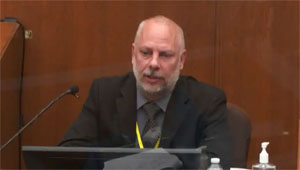
In this image from video, witness David Pleoger, a retired Minneapolis police sergeant answers questions as Hennepin County Judge Peter Cahill presides Thursday, April 1, 2021, in the trial of former Minneapolis police Officer Derek Chauvin at the Hennepin County Courthouse in Minneapolis, Minn. Chauvin is charged in the May 25, 2020 death of George Floyd. (Court TV via AP, Pool)
Minneapolis police policy requires officers to roll prone, restrained people into a “recovery position” on their side to avert potential breathing problems, testified David Pleoger, a recently retired Minneapolis police sergeant.
“If you restrain somebody or leave them on their chest and stomach for too long, their breathing can become compromised,” said Pleoger, saying that the dangers of “positional asphyxia” were included in training and well-known in the police department. Pleoger said he has personally known about the condition for 10 or 15 years.
Chauvin knelt on Floyd’s neck for more than nine minutes as the man lay face down and handcuffed.
Pleoger affirmed that the threat of “positional asphyxia” could stem from just a person’s body weight, without additional pressure.
“So the danger is there without anyone pressing down on them,” prosecutor Steve Schleicher said.
Yes, Pleoger said.
Body camera video captured Thomas Lane, who also faces criminal charges, asking Chauvin if they should turn Floyd on his side. Chauvin said it was not necessary.
The state previewed Pleoger’s testimony in opening statements Monday. Prosecutor Jerry Blackwell told the jury that Pleoger would tell them “the force against Mr. Floyd should have ended as soon as they put him on the ground.”
5:30 a.m.
Fire captain says he understood off-duty firefighter’s distress after seeing ‘severity’ of Floyd’s condition
by Hannah Knowles
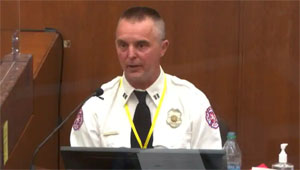
In this image from video, witness Capt. Jeremy Norton of the Minneapolis Fire Department answers questions as Hennepin County Judge Peter Cahill presides Thursday, April 1, 2021, in the trial of former Minneapolis police Officer Derek Chauvin at the Hennepin County Courthouse in Minneapolis, Minn. Chauvin is charged in the May 25, 2020 death of George Floyd. (Court TV via AP, Pool)
Jeremy Norton, a Minneapolis fire captain, testified Thursday that he sent crews to check on a distraught off-duty firefighter who tried to intervene in Floyd’s arrest, realizing “the justification for her duress” as he saw Floyd’s poor condition in an ambulance.
“We came in with very little information,” Norton testified, saying he did not initially understand why the off-duty first responder, Genevieve Hansen, was so distressed.
Hansen testified tearfully earlier this week that she was “desperate” to help Floyd, and jurors heard her 911 call: “I literally watched police officers not take a pulse and not do anything to save a man,” she said at the time.
Norton said Thursday that “once we got in the ambulance and I saw the severity of Mr. Floyd’s condition and the gravity, I understood, I was able to infer or put together what she had been talking about. And I understood the justification for her duress. And so I sent my crew back to check on her to make sure she was okay.”
Norton said he walked past Hansen upon arriving at the scene of Floyd’s arrest, and went inside Cup Foods, looking for an injured person. Floyd was actually pinned outside the store.
“The call was confusing because we did not have a lot of information,” said Norton, a certified EMT who has been with the city fire department for more than two decades. “So I did not have a patient description.”
He said he gathered from Hansen and an “upset” crowd that Floyd had been injured in a “scuffle” with police.
Eventually, Norton said, he and his partner entered the ambulance where Floyd was lying face up on a stretcher, unresponsive, a breathing tube down his throat and a device working to compress his heart. Floyd was taken to the hospital.
5:25 a.m.
‘I was trying to give him a second chance at life,’ paramedic recalls
by Timothy Bella
While Floyd remained in what Derek Smith described as “a dead state,” the paramedic recounted to prosecutors Thursday how he administered a shock with a defibrillator to try to get the 46-year-old out of cardiac arrest.
When asked by prosecutors to walk them through the process for a potentially lifesaving situation like the one May 25, Smith said he hoped the action would help resuscitate Floyd.
“He’s a human being, and I was trying to give him a second chance at life,” Smith said.
CBS News
@CBSNews
Derek Smith, a paramedic who treated George Floyd, describes his unsuccessful efforts to revive Floyd in the ambulance:
"He's a human being, and I was trying to give him a second chance at life."
12:30 PM Apr 1, 2021
But Smith said to the court that Floyd remained in cardiac arrest and “was still deceased” by the time they arrived at the hospital.
Responding to whether police could have started medical treatment to Floyd, Smith told the defense there was “no reason” Chauvin and the officers couldn’t have started chest compressions before paramedics arrived.
Rylie Seidl
@RylieSeidl
Derek Smith, Paramedic who arrived on scene after Floyd was already dead: "there's no reason minneapolis couldn't have started chest compressions" #DerekChauvinTrial
12:17 PM Apr 1, 2021

